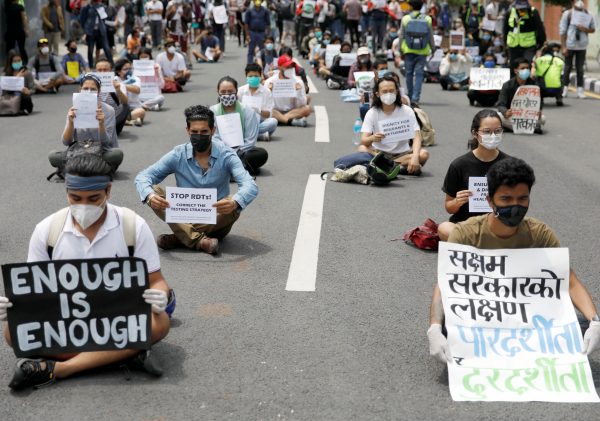s
Nepal initially responded by suspending incoming international flights on 22 March. But the porous open border with India enabled people to undertake risky border crossings by bribing border police. The Indian government’s apparent lack of sympathy for migrant workers amid the health crisis caused complete chaos and led to the mass movement of migrant workers. With many trying to return home, it increased the risks of an uncontrolled and untraceable spread of COVID-19. These workers felt that it would be better to return to Nepal rather than stay in a city under lockdown without work where they would never be prioritised for healthcare if they got infected.
Political tensions have risen between India and Nepal over the inauguration of India’s Himalayan link road that traverses disputed territory claimed by both countries. Increased geopolitical tensions amid a pandemic could compromise public health responses and access to required medical supplies and equipment. The humanitarian crisis at the India–Nepal border dominated social media news but the Nepali federal government has kept quiet amid the growing tensions with India.
The pandemic has also infected Nepal’s domestic political stability by exacerbating divisions in the government. Nepal’s Prime Minister Khadga Prasad Sharma Oli was in frail health after a second kidney transplant in March this year that left him largely incapacitated. Deputy Prime Minister and Minister for Defence Ishwar Pokhrel was instead entrusted to handle the COVID-19 response through a high-level Government Coordination Committee. But the government failed to provide a single point of coordinated effort as each minister acted on their own volition, with the effect being more ceremonial than impactful.
The procurement of testing kits and other medical supplies became highly controversial as the ruling party made sure to procure suppliers who were willing to contribute the party. Graft became pervasive at every step of the procurement process. The government even handed over parts of its civilian functions to the Nepalese Army in procuring supplies — a concerning politicisation of the military.
Despite his frail health, Prime Minister Oli has tried to portray an image of normality as he addresses the nation, but his credibility and popularity is waning. In his quest to ensure his own political survival amid intra-party squabbles, he announced ordinances that would purportedly risk splitting the ruling party and enable control over the appointment of people to the constitutional bodies, such as the anti-corruption body. But President Bidhya Devi Bhandari retracted these ordinances after facing much criticism.
Prime Minister Oli then trained his political guns on stirring nationalism to consolidate his weakening political position as he has often done in the past. He has taken on India over the inauguration of the Himalayan Link road to China through Nepal, alleging that its construction was undertaken without Nepal’s permission. The Chief of the Indian Army provided further ammunition for Oli when he characterised Nepal’s opposition as acting on the behest of external forces, pointing to China.
The media frenzy in India that portrayed Oli as China’s stooge provided him a powerful political veil to push his nationalist agenda. Oli’s nationalist push garnered the political support of the Nepali Congress in seeking to grant constitutional status to an updated map claiming the disputed territory of Kalapani as Nepal’s territory. Oli’s political manoeuvring is distracting the country from taking effective measures to combat the pandemic. It draws attention away from the inadequate testing, the absence of an economic recovery plan and the lack of general preparedness to handle the pandemic.
Having previously faced shutdowns during natural disasters like earthquakes and floods, Nepal can respond well to lockdowns and supply chain disruptions. Police effectively enforced the initial lockdown, but over time political agendas trumped the public health agenda and those with political ties could pay their way through the country during lockdown.
Quarantine and isolation facilities became grossly mismanaged and a few voluntary groups scrambled to provide basic food and water. Private hospitals blamed the government for failing to integrate private healthcare facilities. The Nepali private sector was busy figuring out rent-seeking opportunities in their cartel groups rather than cooperating with the government in overcoming this challenge.
The pandemic has shown that Nepal’s politics and government reflect the state of society. The border crisis became an opportunity to divert Nepal’s attention from the public health crisis towards politics instead. It reflects a blissful ignorance that discussing border maps will keep coronavirus troubles away.
Sujeev Shakya is CEO of Beed Management, a Nepal-based consulting firm. He is also Senior Advisor for Nepal and Bhutan for BowerGroupAsia and Chair of the Nepal Economic Forum.
This article is part of an EAF special feature series on the novel coronavirus crisis and its impact.

